|
On the mechanics of writing, grammar, word usage, paragraph organization, and understandability.
|
| 1. |
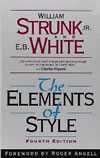 |
The Elements of Style, Fourth edition
by William Strunk, Jr. and E. B. White
104 pages, published 1999.
Read this first! This classic is a reference book, with little exposition. Full of examples of how to do things right, and avoid doing them wrong, it deals with the
mechanics of punctuation, word usage, and proper writing. The effective application of its wisdom will bring you much closer to publication.
|
| |  |  |
| 2. |
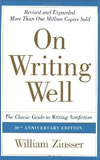 |
On Writing Well 30th Anniversary Edition: The Classic Guide to Writing Nonfiction
by William Zissner
336 pages, published 2006.
The title says "Non-fiction," but don't let that fool you. The techniques described in this book work equally well with fiction. Read this after
Strunk, and before Cheney or Brown & King.
|
| |  |  |
| 3. |
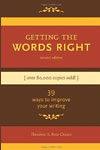 |
Getting the Words Right, 39 Ways to Improve Your Writing
by Theodore Cheney
256 pages, published 2005.
A self editing masterpiece for NON-FICTION writers (see Browne & King, for the fiction equivalent).
Following Cheney's
precepts will streamline your work, make it easier to read, and convey your message in fewer words.
|
| |  |  |
| 4. |
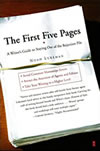 |
The First Five Pages,
A Writer's Guide to Staying Out of the Rejection Pile
by Noah Lukeman
208 pages, published 2000.
Whether you are a novice writer or a veteran who has already had your work published,
rejection is often a frustrating reality. Literary agents and editors receive and reject hundreds of manuscripts each month.
While it's the job of these publishing professionals to be discriminating, it's the job of the writer to produce a
manuscript that immediately stands out among the vast competition.
|
| |
|
On story-telling, plot, and structure.
|
| 5. |
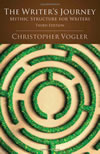 |
The Writer's Journey, Mythic Structure for Writers, 3rd Edition
by Christopher Vogler
300 pages, published 2007.
Based on the wisdom of Joseph Campbell, Vogler has reduced story-telling to its essentials. His treatise is easy to read and
apply. This is a powerfully informative presentation for those who've enjoyed, but never really thought about, what makes a great novel.
|
| |
|
Editing.
|
| 6. |
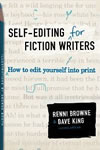 |
Self-Editing for Fiction Writers, Second Edition: How to Edit Yourself Into Print
by Renni Browne and David King
288 pages, published 2004.
A self editing masterpiece for FICTION writers (see Cheney, for non-fiction).
Clear, step by step instructions detail everything you did wrong in your first draft. Yes, they mention you by name.
An absolute must-read for the self-editing process that is demanded if you wish to get published.
|
|
Inspiration and Creativity.
|
| 7. |
 |
5,000 WRITING PROMPTS: A Master List of Plot Ideas, Creative Exercises, and More
by Bryn Donovan
451 pages, published 2019.
A must-have resource for novelists, short story writers, and other creators. It's not only for people with writer's block, but also for people who
want to write faster and make their stories richer and better.
|
|
Grammar and Punctuation .
|
| 8. |
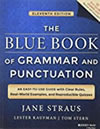 |
The Blue Book of Grammar and Punctuation
by Jane Straus
224 pages, published 2014.
A concise, entertaining workbook and guide to English grammar, punctuation, and usage.
This user-friendly resource includes simple explanations of grammar, punctuation, and usage with scores of helpful examples.
|
| |  |  |
| 9. |
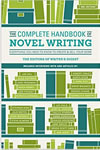 |
The Complete Handbook of Novel Writing
by Writer's Digest Book
528 pages, 3rd ed. published 2017.
Everything You Need to Know to Create & Sell Your Work.
In this 3rd Edition, you'll learn from established writers about how to make your novel a reality.
Discover techniques and strategies for generating ideas, connecting with readers emotionally,
and finding inspiration you need to finish your work.
|
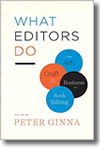 In his book, editor Peter Ginna offers twenty-six essays penned by industry professionals describing
the tasks they perform and their position as author advocates. He provides insight into the black box of manuscript acquisition. In his book, editor Peter Ginna offers twenty-six essays penned by industry professionals describing
the tasks they perform and their position as author advocates. He provides insight into the black box of manuscript acquisition.
Editors as advocates for authors, the essayists say, fall in love with the books they promote to their publishers, and understanding is offered as to why.
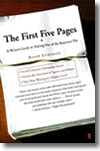 The message of
The First Five Pages, written by a successful New York agent is that they'd love to be in love with your work, but
errors tend to jump out while perfect lines of prosaic poetry need to be flushed out.
Agents receive too many submissions and so many of them are so bad that
they're panning for diamonds in a murky river of poorly developed writings. Yours must sparkle.
The message of
The First Five Pages, written by a successful New York agent is that they'd love to be in love with your work, but
errors tend to jump out while perfect lines of prosaic poetry need to be flushed out.
Agents receive too many submissions and so many of them are so bad that
they're panning for diamonds in a murky river of poorly developed writings. Yours must sparkle.
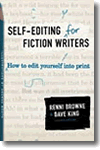 Self-editing is the process of massaging your manuscript until it can entice an agent as you'd beguile a reluctant lover.
It is the process of sifting through your 100,000 words with microscopic attention-to-detail finding
every misused word, misplaced comma, clumsy turn-of-phrase, and more. Self-editing is the process of massaging your manuscript until it can entice an agent as you'd beguile a reluctant lover.
It is the process of sifting through your 100,000 words with microscopic attention-to-detail finding
every misused word, misplaced comma, clumsy turn-of-phrase, and more.
Browne and King's Self-Editing for Fiction Writers is the preeminent resource.
|
|

 In his book, editor Peter Ginna offers twenty-six essays penned by industry professionals describing
the tasks they perform and their position as author advocates. He provides insight into the black box of manuscript acquisition.
In his book, editor Peter Ginna offers twenty-six essays penned by industry professionals describing
the tasks they perform and their position as author advocates. He provides insight into the black box of manuscript acquisition.
 The message of
The First Five Pages, written by a successful New York agent is that they'd love to be in love with your work, but
errors tend to jump out while perfect lines of prosaic poetry need to be flushed out.
Agents receive too many submissions and so many of them are so bad that
they're panning for diamonds in a murky river of poorly developed writings. Yours must sparkle.
The message of
The First Five Pages, written by a successful New York agent is that they'd love to be in love with your work, but
errors tend to jump out while perfect lines of prosaic poetry need to be flushed out.
Agents receive too many submissions and so many of them are so bad that
they're panning for diamonds in a murky river of poorly developed writings. Yours must sparkle.
 Self-editing is the process of massaging your manuscript until it can entice an agent as you'd beguile a reluctant lover.
It is the process of sifting through your 100,000 words with microscopic attention-to-detail finding
every misused word, misplaced comma, clumsy turn-of-phrase, and more.
Self-editing is the process of massaging your manuscript until it can entice an agent as you'd beguile a reluctant lover.
It is the process of sifting through your 100,000 words with microscopic attention-to-detail finding
every misused word, misplaced comma, clumsy turn-of-phrase, and more.














